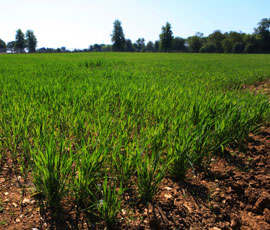GM food poses no risk, says EU chief scientist

Genetically modified organisms pose no greater risk than those farmed in a conventional way, the European Commission’s chief scientific advisor has said.
Anne Glover said there was no evidence GMs had any impact on human, environmental or animal health and said science around the technology had to play a stronger role in European policymaking.
Urging a less precautionary approach to GMs, she said the technology needed be explored further as a way to address the challenges of producing more food while using fewer resources such as land, energy and water.
“I would be confident in saying that there is no more risk in eating GMO food than eating conventionally farmed food,” Professor Glover told EurActiv website.
“If we are using land to produce biofuels, we are not producing food and that that means we have to intensify food production.”
Professor Glover, who was Scotland’s chief scientific advisor before joining the commission in January, said public and political discomfort around GMs in the 1980s and 1990s was a “generation ago”.
While the precautionary principle towards GMs was appropriate when applied properly, the challenges the world now faced were completely different and warranted a fresh look at the science around the technology, she added.
“I think we could really get somewhere in Europe if, when evidence is used partially, there were an obligation on people to say why they have rejected evidence,” said Prof Glover.
“The evidence with which I work is independent, it does not change according to political philosophy. And that should give people a lot of confidence.”
She added: “We should not somehow tie our hands behind our back in such a way that we will be so precautionary that we wait for everyone else to use our knowledge before we use it.”
“That would be my worry, because knowledge is an international currency and we are among the slowest in taking advantage of the knowledge we create and that cannot be right.”
See our page on GM crops
